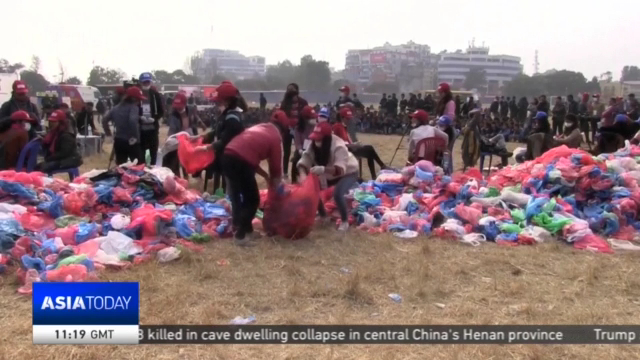
19:52, 22-Dec-2018
Trash in Asia: Nepal wants to clean up trash on Mount Qomolangma
Updated
19:40, 25-Dec-2018
03:06

In Nepal, climbers attempting to reach the summit of Mount Qomolangma, also known as Mount Everest, are now obliged leave a four thousand-dollar deposit, which is only refunded if they return from the peak with all of their trash. The initiative is part of an effort to clean up the huge amount of garbage left on the mountain over the years. But much remains from the estimated forty thousand tourists who walked the trail to base camp this year. And cleaning up remains a huge logistical problem in Nepal, as Tony Cheng reports.
The pristine peak of Mount Everest, the highest point on earth. But even at this remote place, man-made pollution is everywhere. Camping equipment, discarded clothing and thousands of plastic bags, left by years of expeditions.
Trekkers and climbers, vital to Nepal's economy, have not been kind to the environment. The waste has to be removed by mule trains that trek down the mountain paths for days and in this remote and inaccessible part of the world, recycling isn't an option. The end of the trail is Lukla.
TONY CHENG NEPAL "One of the biggest challenges in dealing with the plastic waste pollution in the Everest region is what to do with it all, and at the moment, the only option is to fly it out from here, Lukla, the tiny airport that serves the whole area and is infamous as the most dangerous airport in the world."
Concerted efforts are now being made to reduce the rubbish on the mountain and remove it completely from the area. The bags of rubbish quickly mount up and they eat up valuable weight on the few flights that can land at this tiny airport. Not only is the plastic waste a problem, but cleaning it up is leaving a considerable carbon footprint.
The view of the Himalayas from the capital now is increasingly obscured by pollution. And residents here are increasingly frustrated with the growing piles of waste. This event, designed to highlight the problem, created a map of the dead sea with discarded plastic bags.
MIROJ SHRESTHA ORGANIZER OF 'THE DEAD SEA MAP' "We have used 100,000 plastics to create the map of the Dead Sea with a message that one dead sea is enough, we don't need other dead seas."
For a nation known for its sites of natural beauty, it is a jarring sight. And the message is intended to target a younger audience, for whom Nepal's natural beauty will be a vital resource.
PRAGATI DAHAL STUDENT "It is our responsibility to keep our environment clean and healthy. I am a student of environment science and I participated in this event so that my little help can go towards the environment."
Picking up bags in the park is one thing, but truly cleaning up this mountainous nation will be a much great task. Tony Cheng, CGTN, Nepal.

SITEMAP
Copyright © 2018 CGTN. Beijing ICP prepared NO.16065310-3
Copyright © 2018 CGTN. Beijing ICP prepared NO.16065310-3